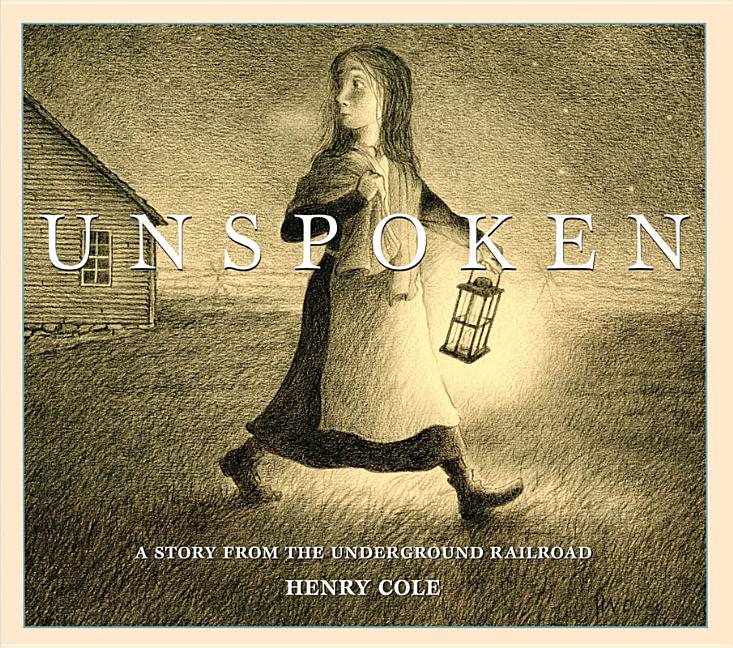Book Descriptions
for Unspoken by Henry Cole
From Cooperative Children's Book Center (CCBC)
Black pencil illustrations on buff-colored pages detail a wordless story set during the Civil War. A quilt with the North Star pattern hung on a rail fence comprises the opening page spread, which is followed by a scene showing Confederate soldiers riding across a field bordering the fence. A young white girl on the farm is doing chores. Inside the barn she sees a single eye peering out from a shock of corn. Later, she sets a biscuit from the dinner table on the barn floor; other offerings follow. Two men in search of a runaway slave leave with the extra horse they brought along still rider-less. That night, the girl returns once more to the barn and finds a gift: a cornstalk doll, wearing a dress made from the napkin in which she’d delivered food. In an author’s note Cole writes about growing up in Loudoun County, Virginia, on the edge of the Confederacy, where the Civil War was family history still regularly talked about. He also notes that escaped slaves sought out safe houses in the area. This imagined story is rooted in history if not in specific facts and offers much for children to discover and discuss, not the least of which is the meaning of the title, so appropriate to a story in which silence abounds and in which actions rather than words speak volumes. (Ages 7–11)
CCBC Choices 2013. © Cooperative Children's Book Center, Univ. of Wisconsin - Madison, 2013. Used with permission.
From the Publisher
A Civil War–era girl’s courage is tested in this haunting, wordless story.
When a farm girl discovers a runaway slave hiding in the barn, she is at once startled and frightened. But the stranger’s fearful eyes weigh upon her conscience, and she must make a difficult choice.
Will she have the courage to help him?
Unspoken gifts of humanity unite the girl and the runaway as they each face a journey: one following the North Star, the other following her heart.
Henry Cole’s unusual and original rendering of the Underground Railroad speaks directly to our deepest sense of compassion.
Praise for Unspoken
A New York Times Best Illustrated Book
“Designed to present youngsters with a moral choice . . . the author, a former teacher, clearly intended Unspoken to be a challenging book, its somber sepia tone drawings establish a mood of foreboding.” —The New York Times Book Review
“Moving and emotionally charged.” —Kirkus Reviews, starred review
“Gorgeously rendered in soft dark pencils, this wordless book is reminiscent of the naturalistic pencil artistry of Maurice Sendak and Brian Selznick.” —School Library Journal, starred review
“Cole’s . . . beautifully detailed pencil drawings on cream-colored paper deftly visualize a family’s ruggedly simple lifestyle on a Civil War–era homestead, while facing stark, ethical choices . . . Cole conjures significant tension and emotional heft . . . in this powerful tale of quiet camaraderie and courage.” —Publishers Weekly, starred review
When a farm girl discovers a runaway slave hiding in the barn, she is at once startled and frightened. But the stranger’s fearful eyes weigh upon her conscience, and she must make a difficult choice.
Will she have the courage to help him?
Unspoken gifts of humanity unite the girl and the runaway as they each face a journey: one following the North Star, the other following her heart.
Henry Cole’s unusual and original rendering of the Underground Railroad speaks directly to our deepest sense of compassion.
Praise for Unspoken
A New York Times Best Illustrated Book
“Designed to present youngsters with a moral choice . . . the author, a former teacher, clearly intended Unspoken to be a challenging book, its somber sepia tone drawings establish a mood of foreboding.” —The New York Times Book Review
“Moving and emotionally charged.” —Kirkus Reviews, starred review
“Gorgeously rendered in soft dark pencils, this wordless book is reminiscent of the naturalistic pencil artistry of Maurice Sendak and Brian Selznick.” —School Library Journal, starred review
“Cole’s . . . beautifully detailed pencil drawings on cream-colored paper deftly visualize a family’s ruggedly simple lifestyle on a Civil War–era homestead, while facing stark, ethical choices . . . Cole conjures significant tension and emotional heft . . . in this powerful tale of quiet camaraderie and courage.” —Publishers Weekly, starred review
Publisher description retrieved from Google Books.


